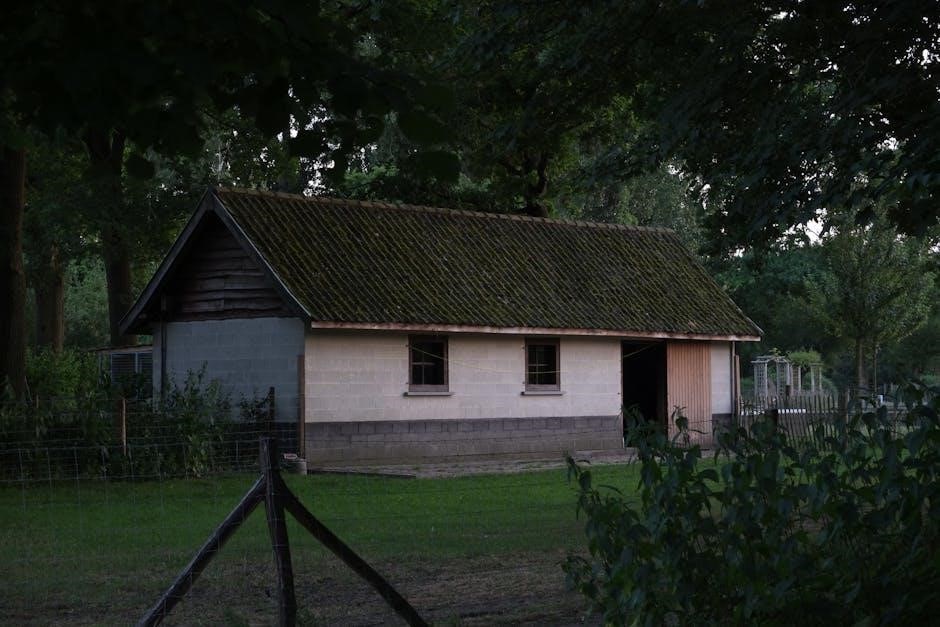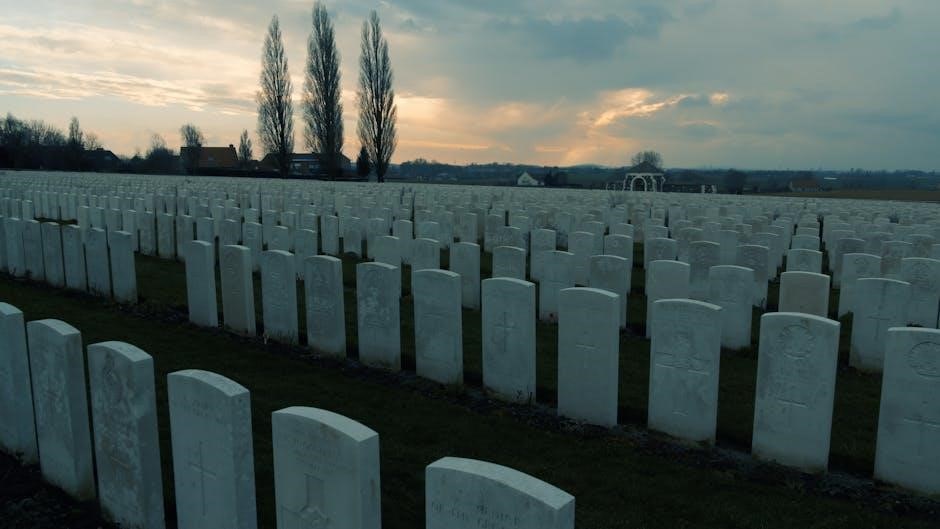Background Information on the Poem
The poem In Flanders Fields was written by John McCrae, a Canadian physician and soldier, in 1915.
It is a reflection on the sacrifices of war and the passing of time.
The poem’s background is rooted in McCrae’s experiences during World War I, where he witnessed the death of his friend.
This event had a profound impact on McCrae, leading him to write the poem as a tribute to the fallen soldiers.
The poem’s themes of mortality, remembrance, and the cycle of life are still relevant today.
The poem has become an iconic symbol of the sacrifices made during wartime and is often recited on Memorial Day.
Its message continues to resonate with people around the world, making it a timeless classic.
The poem’s history and significance are a testament to the power of literature to capture the human experience.
The poem is widely available, including in PDF format, for readers to access and appreciate its beauty and significance.

Historical Context of the Poem
Historical context of the poem is World War I and its impact on society and culture instantly today always remembered and honored through various mediums and formats online.
John McCrae and His Experience in World War I
John McCrae was a Canadian physician and soldier who fought in World War I, his experiences during the war had a profound impact on his life and work. He witnessed the harsh realities of war and lost many comrades, including his friend Alexis Helmer, who died in battle. This event inspired him to write the famous poem In Flanders Fields, which has become a symbol of remembrance and sacrifice. McCrae’s experiences in World War I shaped his perspective on life and death, and his poem continues to be a powerful tribute to those who have made the ultimate sacrifice. His story is a testament to the human cost of war and the importance of remembering those who have served. McCrae’s legacy lives on through his poetry and his contributions to the war effort.

The Significance of the Poem
The poem has great significance and meaning today still remembered and honored always by people everywhere instantly and quickly through various online platforms and websites easily.
Analysis of the Poem’s Themes and Symbolism
The poem explores themes of mortality, sacrifice, and remembrance, using symbolism to convey the devastating impact of war on individuals and society. The poppies that blow in Flanders fields are a symbol of the bloodshed and loss of life, while the larks singing in the sky represent the continuation of life and hope. The poem’s use of imagery and metaphor adds depth and complexity to its themes, inviting readers to reflect on the human cost of war and the importance of honoring the dead. The analysis of the poem’s themes and symbolism reveals a powerful and moving work that continues to resonate with readers today, offering a poignant reminder of the importance of peace and remembrance. The poem’s symbolism is a key element in its enduring appeal and significance.
The Poem’s Structure and Style
The poem’s structure and style are characterized by simple and powerful language using ol and ul tags for organization and emphasis always effectively online now.
Use of Imagery and Metaphor in the Poem
The poem utilizes vivid imagery and metaphor to convey the harsh realities of war, with the poppies serving as a symbol of remembrance and sacrifice, as seen in the lines where the speaker describes the poppies blowing in the fields. The use of sensory details, such as the sound of the larks singing and the smell of the poppies, creates a powerful and evocative image in the reader’s mind. The metaphor of the poppies as a symbol of the dead soldiers is particularly effective in conveying the poem’s themes of mortality and remembrance. The poem’s use of imagery and metaphor adds depth and complexity to its exploration of the human experience of war, making it a rich and thought-provoking work of literature that continues to resonate with readers today, with its message and themes still widely relevant and discussed.

Available Versions of the Poem
Multiple versions of the poem are available online in various formats including PDF and digital books instantly for easy access and reading purposes every day.
Free Printable Version of In Flanders Fields
A free printable version of the poem is available for download, allowing users to print and share the poem easily. This version is often used in educational settings and for memorial services. The poem’s text is typically formatted in a clear and readable font, making it easy to print and display. Many websites offer this free printable version, and it can be found using a simple search engine query. The printable version is a great way to share the poem with others and to preserve its message for future generations. It is a popular resource for teachers, students, and anyone looking to learn more about the poem and its significance. The free printable version is a valuable tool for exploring the poem’s themes and historical context. It is widely available online and can be downloaded instantly.
Memorial Day and the Poem’s Relevance
Memorial Day remembers fallen soldiers and the poem’s relevance is honored with ceremonies and tributes every year always.
Connection to World War I and Memorial Day
The poem has a significant connection to World War I and Memorial Day, as it was written during the war and speaks to the sacrifices made by soldiers. The poem’s themes of loss, grief, and remembrance are particularly relevant on Memorial Day, when people come together to honor the fallen. The poem’s author, John McCrae, was a soldier himself and drew inspiration from his experiences in the war. The poem’s message of respect and gratitude for those who have made the ultimate sacrifice is one that resonates deeply on Memorial Day. The connection between the poem and the holiday is a powerful one, and it continues to be an important part of Memorial Day commemorations. The poem’s words are a reminder of the importance of honoring the past and remembering those who have served.

and Final Thoughts
Importance of Preserving Historical Literature
The importance of preserving historical literature like In Flanders Fields PDF cannot be overstated, as it provides a window into the past and helps us understand the context and significance of historical events. By preserving these works, we can learn from the experiences and perspectives of those who came before us. This is especially true for works like In Flanders Fields, which offer a unique glimpse into the realities of war and its impact on individuals and society. Preserving historical literature also helps to promote cultural heritage and identity, and allows us to appreciate the literary and poetic achievements of the past. Overall, preserving historical literature is crucial for our understanding of the world and our place in it, and efforts should be made to ensure that these works are protected and made accessible for future generations. This is essential for many reasons.
